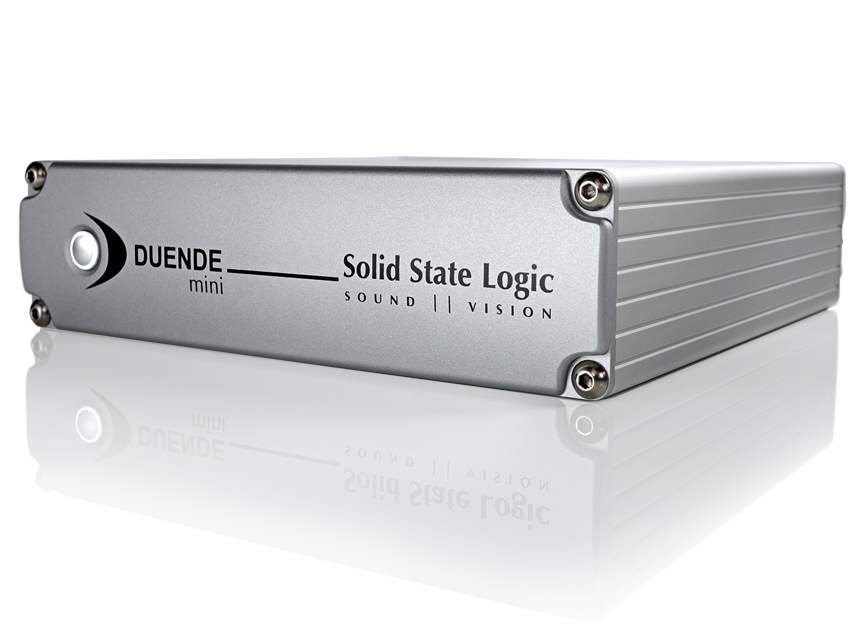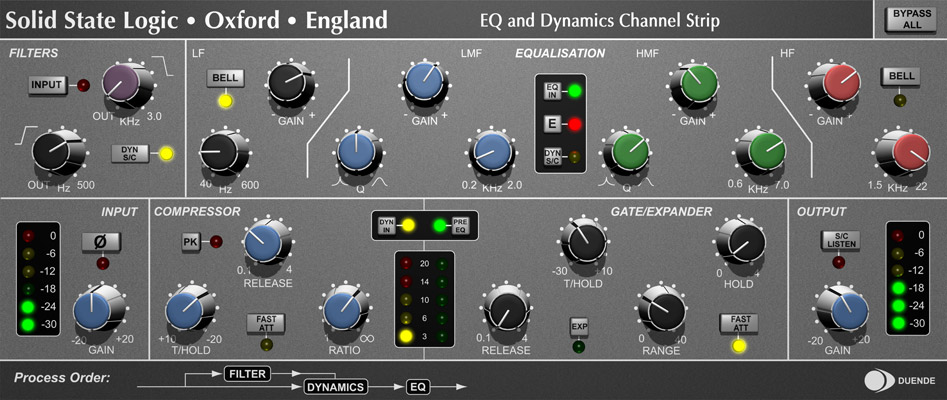MusicRadar Verdict
Duende Mini gives you a cheaper route into SSL's plug-in platform, but you'll need to spend more if you want more than one plug-in.
Pros
- +
An expandable system. More affordable than the Classic model. Great SSL sound.
Cons
- -
Additional plug-ins cost extra.
MusicRadar's got your back

SSL Duende Mini

Duende Mini plug-in
High-end audio company SSL launched its original Duende powered plug-in system in 2006. Although it was very well-received, the relatively high price tag might have deterred a few.
It´s no surprise then that SSL has returned with a cutdown version: Duende Mini. So, what are the differences? First up, it´s considerably more compact (it measures about six inches square) and on the DSP front, it offers half that of the Duende Classic.
In plug-in terms this means 16 mono or eight stereo instances (up to 96kHz), although you can buy a DSP upgrade that doubles the plug-in count to match the Classic.
Like its sibling, the box can run directly from 6-pin FireWire power, although there´s an external power supply included too. And, in line with the latest driver support, you can run two units together on one machine. So if you´ve got the cash, two fully upgraded Minis could give you a maximum of 64 mono instances.
Plug-ins
SSL has gradually expanded the range of available Duende plug-ins - there are now five in total. However, one of the compromises with the Mini is that it only ships with one as standard. This is the EQ and Dynamics Channel, which offers both the famous E and G EQs, filters, compressor/limiter and gate/expander.
Ported from the C200 digital console, this represents one important element of ‘the SSL sound´. It offers a hugely powerful EQ, peak and RMS style dynamics (with the famous ‘over-easy´ compression) and flexible onboard routing.
Another crucial part of the SSL sound is the Stereo Bus Compressor, but unfortunately, this is an optional extra for the Mini. However, SSL provided us with a fully-maxed unit so that we could give you an overview of all five plug-ins.
The other three are the mastering grade X-EQ and X-Comp, and the all-in-one Drumstrip processor. By our calculations, if you wanted all four extra plug-ins authorised on the Mini you´d be looking at roughly an extra £1100. Serious money, so why so expensive?
Well, to be fair, these are impressive plug-ins. X-EQ, designed with the help of top software developer Algorithmix, really is about as precise and flexible as EQs get. Not only does it offer 10-bands with a multitude of parametric and filter styles, but it even includes a parallel mode where a split signal is processed independently, then summed at the output.
Similarly the X-Comp is no slouch, and includes an excellent ‘bleed through´ system for frequency dependent compression. You´ll also note some excellent metering in the form of a gain reduction history and a form of amplitude histogram.
Possibly the most innovative plug-in is the Drumstrip. As you might imagine, this includes a selection of drum-specific tools ranging from the transient shaper and gate to LF and HF enhancers. It also features the famous SSL Listen Mic Compressor. The processing order can be easily rearranged to suit your needs and if you´re using it as an insert, the dry/wet option at the output is an excellent way to get the overall blend you desire.
Results
The SSL sound has been well-documented over the years, and the two ‘retro´ plug-ins here deliver plenty of its acclaimed character. The flexibility of the Channel Strip is well complemented by the glue-like nature of the Stereo Bus Compressor and, although this costs extra, if you´re going to go for the Duende Mini, we would have to recommend this as a ‘must have´.
Of the five plug-ins, the Drumstrip feels like the odd one out as it offers a far more creative processing palette. It´s nice to see the Listen Mic Compressor, but sonically we particularly like both the LF enhancement section (great for kicks) and the transient shaper (great for snares).
X-EQ and X-Comp lead Duende off into slightly different territory, offering far more complex processing than you´ll find in the other three. The sound of X-EQ is particularly impressive, and the X-Comp is great for transparent compression. Alas, these are the two most expensive plug-ins of the lot.
Summary
With its updates, SSL has spent considerable time improving Duende´s performance and preparing detailed explanations of the best setups for different applications.
Obviously, the big draw with the Duende system is the quality of the plug-ins. With years of advanced processor design under its belt, being able to plug your native system directly into the SSL mothership is hugely attractive.
Duende Mini offers a cheaper route into this system, but when you factor in the cost of fully loading it up, it can still work out pretty expensive, and this may well push people away. This would be a shame, as the sound of the Duende is as good as anything on the market.
MusicRadar is the number 1 website for music makers of all kinds, be they guitarists, drummers, keyboard players, djs or producers...
GEAR: We help musicians find the best gear with top-ranking gear round-ups and high- quality, authoritative reviews by a wide team of highly experienced experts.
TIPS: We also provide tuition, from bite-sized tips to advanced work-outs and guidance from recognised musicians and stars.
STARS: We talk to musicians and stars about their creative processes, and the nuts and bolts of their gear and technique. We give fans an insight into the actual craft of music making that no other music website can.
“I said, ‘Are we sure we can write a song about death?’”: The story of Mike + The Mechanics' classic No.1 The Living Years
“Without investment in music education our talent pipeline is at risk of drying up along with the huge opportunities for economic growth it brings”: UK Music draws up five point plan to “turbocharge” music education
“How daring to have a long intro before he’s even singing. It’s like psychedelic Mozart”: With The Rose Of Laura Nyro, Elton John and Brandi Carlile are paying tribute to both a 'forgotten' songwriter and the lost art of the long song intro










